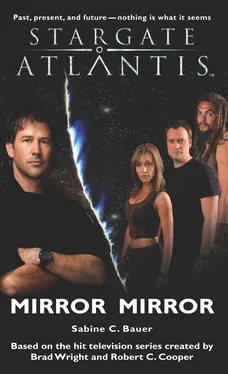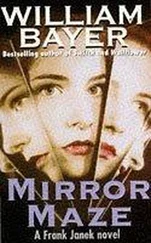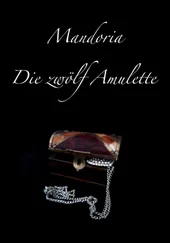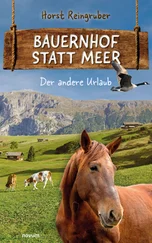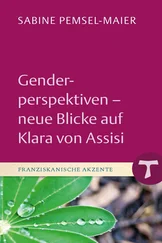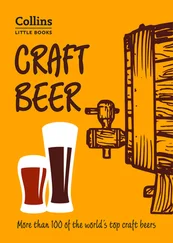Spurred by a bout of inquisitiveness strong enough to startle him-their culture discouraged inquisitiveness — he shouldered his way past some bushes and headed in among the trees. He began scraping the topsoil off the ground and within minutes found the floor beneath. Not stone, not wood-wood would have decayed ages ago-but some smooth, shiny material that somehow struck him as oddly familiar, as oddly familiar as the entire layout of this place. He pushed further into the undergrowth and found what at first glance looked like boulders. They weren't. They were tables, or benches maybe, overgrown to the point of being barely recognizable. Only, he did recognize them. He'd seen them before, though when or where he couldn't begin to fathom. There would have been people sitting here, operating devices now forbidden.
And-he'd known every single one of them.
He'd been one of them.
The impact of the notion sent him reeling back a step, and he tripped and almost fell. As he tried to regain his balance, he trod on a twig. It snapped with a loud crack. Trembling, he spun around, saw the object he'd stumbled over. Not a rock. Not a branch, either. And he was starting to guess what this place was. He shouldn't be here. He should leave. For some reason that wasn't an option, though.
He crouched clumsily and picked up the skull. It was gleaming white and slick with the pervasive moisture, and it was human, like the rest of the bones. He sniffed it, wondering the same instant how he knew to do this, remembering a darkhaired, excitable man with a white coat and a strange accent. Both of which were immaterial now. The skull had no discernible odor at all, which meant its owner had died a long time ago. Among the bleached heap of bones that had once been a ribcage lay a couple of metal plates attached to a chain. Some kind of necklace or other ornament, perhaps. He set down the skull, snatched the necklace and frowned at it. The metal plates were embossed with several lines of writing: A name. Then a long number. Then AF. Then AB neg. Then Catholic.
He should not have been able to read this-or any other writing, for that matter. Literacy was the first evil of Ikaros. Shivering, he stared at the metal plates, knowing with absolute certainty that this should mean something to him. The name should mean something to him.
Sheppard, John.
Colonel.
That wasn't written on the plates, but he knew it was connected.
Colonel Sheppard.
A face floated free from that muddle of memories inside his mind. Young and annoyingly handsome, though the shadow of distrust in the eyes belied both youth and looks.
That might take a while.
He straightened up, stung as a whole slew of images flooded back. That man, that colonel, had been a friend, which was unusual, to say the least. He didn't have the kind of personality that allowed him to make friends, and he knew it. He cultivated it, because he'd realized early on that it kept people at arm's length. And as long as people remained at arm's length they couldn't hurt you, deliberately or otherwise, they couldn't make demands. It simply was easier this way. Sheppard's and his friendship, prickly and at times almost adversarial, had developed despite themselves, but it most certainly had been a friendship. At least until he'd almost killed the man, succeeded in killing another, destroyed whole worlds.
But even then it hadn't been irredeemable. It-
Startled by the sharp snap of another breaking twig, he whirled around, came face to face with a bunch of wet snouts and red, malignant eyes. The hogs had caught up with him, and for a moment he gazed at them uncomprehendingly. How in God's name had he ended up here, with them?
Squealing with excitement, the hogs pushed past him and toward that desolate heap of bones.
"No!"
The fury was beyond anything he'd ever experienced. As hard as he could and without caring where it hit or how much damage it did, he brought his stick down on snouts, heads, haunches. The lead animal dropped the femur it had snagged and rounded on him with a shriek. A quick series of blows bludgeoned it into retreat, squeaking and snapping. The other animals trotted after it, and at last the herd vanished into the undergrowth.
Panting hard, he dropped the stick, turned back to the remains. His face was wet, he realized, and the rain had nothing to do with it. It was as though his rage had opened the floodgates to make way for every damn painful emotion that wanted to follow. There was a reason why his only permanent attachment had been a cat that preferred his neighbor's company.
John Sheppard, of all people, would have appreciated the irony of it.
Just as well that he wouldn't find out about it now. Nobody would. Why dismantle a carefully cultivated image, right?
He hung those engraved metal plates around his neck, made sure they were hidden under his clothing. Then he carefully gathered the skull. He'd find a safe place, bury it, though he couldn't really have said why, except that just leaving it here seemed wrong and that a burial, however unceremonious, would make him feel better somehow. And this was ironic, too. Dead was dead. He didn't believe in wakes, funerals, and other feel-good rituals. He was a scientist. He was-
Gasping and suddenly oblivious to the pouring rain, he sat back on his heels.
He was a scientist, a physicist.
He was a prodigy, a Nobel prospect.
He also was stranded in the armpit of the universe, herding swine in a Luddite theme park.
Why?
He still had no recollection of what had happened to make him end up in this place, but he'd find out. He owed it to himself. And then he'd get the hell out of here and look for the others. Colonel Sheppard, with that blithe military approach of demanding the impossible, would expect him to-he always had-and somehow this seemed a far better way of honoring the dead than wakes and all the rest of it.
In the mud at his feet glistened a small shard of metal that must have broken off from some piece of the ruined equipment that littered the place. He picked it up, rose, and wandered over to that desk-workstation? — he'd found earlier. Slowly, deliberately, and partly to make sure that he wouldn't forget it again, he began scratching letters into the weather-pitted surface:
Maros.
No. That was wrong. What was he thinking?
He scratched it out, started again.
Dr Meredith Rodney McKay.
Charybdis +32 to Charybdis -4441
The jumper's rear hatch opened, and Major John Sheppard climbed up the ramp, dumped his crutches on a bench in the aft compartment-good riddance-and limped forward to drop into the pilot's seat, feeling whole for the first time in weeks. Who needed two good legs, if you could fly? He gave a small grin, flexed his fingers and closed them around the stick, trying not to think of how it'd felt the last time he'd done that, three weeks ago.
The systems, all nominal, came online without a hitch. Moments later he hovered above the jumper bay door, watched it open on the HUD, and eased the craft down into the control center and in front of the Stargate. Teyla stood near the top of the stairs. He doubted she'd return to the surface. They hadn't talked about it, but he couldn't shake the certainty that she'd remain in Atlantis. It had become her home, too.
His gaze settled on the onboard dialing panel. Rodney probably could have given him the exact number of possible combinations, though after the first million you might as well stop counting. Besides, Rodney wasn't here. For all John knew, some version of Rodney was lying back there among all the other bodies, and he could only hope that the original was still alive. That all the originals were still alive.
If Teyla was right-and John figured that was as likely as just about anything else-then it wouldn't really matter what address he dialed; the gate system would attempt to reassemble the fragmented matrices and take him wherever the original was. Even if she was wrong and it didn't work, at least he wouldn't have to worry about running into the Wraith. The Pegasus galaxy might be dying, but it was one hundred percent Wraith-free. Go, Ikaros!
Читать дальше
